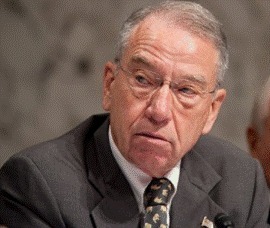by
Astrid Fiano, DOTmed News Writer | July 02, 2010

Sen. Chuck Grassley--haunted
by medical ghostwriters
Think ghostwriting just applies to autobiographies? Ghostwriting happens in the medical industry as well, and is a concern of Sen. Chuck Grassley (R-IA), Ranking Member of the Senate Finance Committee. Grassley recently released a staff report of the committee on the subject of medical ghostwriting. Grassley has also sent a letter to the National Institutes of Health (NIH) to incorporate the report's findings in new disclosure guidelines.
The report focuses on how pharmaceutical and medical device companies help develop articles for publication in medical journals. Companies hire other parties (such as marketing companies) to draft articles, and then give those articles top physicians and scientists to sign onto as authors, in hopes that the article will be published in medical journals. The report says that such ghostwritten articles may be reviews, editorials or research papers. Physicians and scientists may sign on even if they are not very familiar with the data or research involved or provided limited input on the article. The report notes that a professor of medicine at a leading medical school told Committee staff that in the late 1990s and early 2000s pharmaceutical companies often approached him and other colleagues "with requests to review and sign on as primary authors to company studies."
The findings of the report include:
-- The role of pharmaceutical companies in medical publications remains veiled or undisclosed;
-- Some medical schools explicitly prohibit ghostwriting in their policies; these include Columbia, Johns Hopkins Medicine, Stanford Medicine, UCSF, UW Medicine, and Washington University;
-- Detection of ghostwriting by medical schools is limited; although at all schools the staff contacted said they disallowed the practice, faculty members are often not required to report their publication activities to an institution, and stated that ghostwriting is not as easily detected as plagiarism;
-- Strengthening authorship policies in journals may have only limited effect on ghostwriting and disclosure of industry financing of medical articles;
-- The NIH does not have explicit policies on disclosure of industry financing of ghostwritten articles.
Grassley has been investigating medical ghostwriting since 2008. In his letter to the NIH, Grassley said that his concerns are both the lack of transparency of the role medical/pharma companies play in the development of the articles, and that other physicians' reliance on the ghostwritten articles may lead to more prescriptions for treatments that are "more costly or even harmful to their patients."
